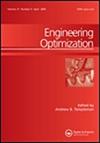一种有效的混合差分进化- jaya算法用于增强汽车涡轮增压器系统的振动特性
IF 2.2
3区 工程技术
Q2 ENGINEERING, MULTIDISCIPLINARY
引用次数: 0
摘要
摘要在满足相互冲突的设计需求的同时提高旋转系统的振动特性是一项艰巨的任务,它通常被视为一个逆问题,并被表述为一个带约束的非线性优化问题。为了解决这一复杂的挑战,一种新的混合算法(HDE-Jaya)被开发出来,结合了差分进化(DE)和Jaya方法。将Jaya模型作为突变算子集成到DE中,以促进勘探和开发。此外,在每次迭代时随机生成交叉概率,以保持多样性。这使得HDE-Jaya成为一个无参数的算法。通过优化6个常见的机械工程设计问题,验证了HDE-Jaya的性能,并进一步在汽车涡轮增压器设计中进行了评估,旨在减少振动,最小化结合应力并提高动态稳定性。结果表明,在求解精度和计算效率方面,HDE-Jaya算法优于DE和Jaya算法。关键词:设计优化反问题mde - jaya汽车涡轮增压器振动水平数据可用性声明作者确认,支持研究结果的数据可以在figshare上找到:https://figshare.com/s/b9694bf562486d1a4254Disclosure声明作者未报告潜在的利益冲突。本文章由计算机程序翻译,如有差异,请以英文原文为准。
An efficient hybrid differential evolution–Jaya algorithm for enhancing vibration behaviour in automotive turbocharger systems
AbstractEnhancing the vibration behaviour of rotating systems while meeting conflicting design needs is a difficult task, which is often treated as an inverse issue and formulated as a nonlinear optimization problem with constraints. To tackle this intricate challenge, a novel hybrid algorithm (HDE-Jaya) has been developed, combining the differential evolution (DE) and Jaya methods. The Jaya model is integrated into DE as a mutation operator to boost exploration and exploitation. In addition, the crossover probability is generated randomly at each iteration to preserve diversity. This makes HDE-Jaya a parameter-free algorithm. The performance of HDE-Jaya was validated by optimizing six common mechanical engineering design problems and further evaluated on an automotive turbocharger design, aiming to reduce vibrations, minimize binding stress and improve dynamic stability. The results indicate that HDE-Jaya is superior to other algorithms, including DE and the Jaya algorithm, in terms of solution accuracy and computational efficiency.KEYWORDS: Design optimizationinverse problemHDE-Jayaautomotive turbochargervibration level Data availability statementThe authors affirm that the data backing the results of the study can be found on figshare at: https://figshare.com/s/b9694bf562486d1a4254Disclosure statementNo potential conflict of interest was reported by the authors.
求助全文
通过发布文献求助,成功后即可免费获取论文全文。
去求助
来源期刊

Engineering Optimization
管理科学-工程:综合
CiteScore
5.90
自引率
7.40%
发文量
74
审稿时长
3.5 months
期刊介绍:
Engineering Optimization is an interdisciplinary engineering journal which serves the large technical community concerned with quantitative computational methods of optimization, and their application to engineering planning, design, manufacture and operational processes. The policy of the journal treats optimization as any formalized numerical process for improvement. Algorithms for numerical optimization are therefore mainstream for the journal, but equally welcome are papers which use the methods of operations research, decision support, statistical decision theory, systems theory, logical inference, knowledge-based systems, artificial intelligence, information theory and processing, and all methods which can be used in the quantitative modelling of the decision-making process.
Innovation in optimization is an essential attribute of all papers but engineering applicability is equally vital. Engineering Optimization aims to cover all disciplines within the engineering community though its main focus is in the areas of environmental, civil, mechanical, aerospace and manufacturing engineering. Papers on both research aspects and practical industrial implementations are welcomed.
 求助内容:
求助内容: 应助结果提醒方式:
应助结果提醒方式:


